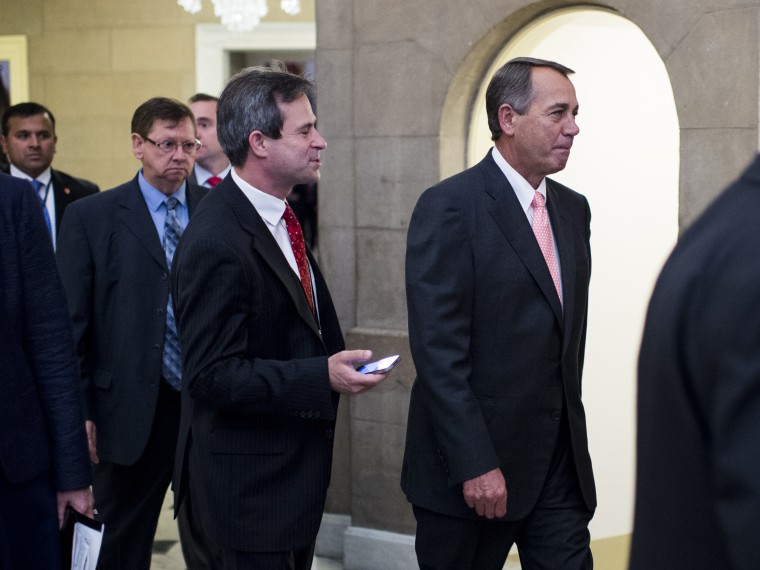Just a few weeks ago, congressional Republicans had high hopes about pending showdowns in Washington. They'd target an unpopular health care law; the public would rally behind them; Democrats would splinter; Republicans would unify; and President Obama would cave. It'd be ... awesome.
We now know, of course, that none of these things actually happened. Indeed, as Rachel noted last night, yesterday seemed to mark a turning point -- Republican leaders started moving away from their "Obamacare" demands; powerhouse conservative groups publicly distanced themselves from GOP strategies; and polls pointed to a flailing and failing party.
Last week, the consensus in Republican circles seemed to be, "We can win this thing." Yesterday, party officials transitioned to, "We need to get out of this thing."
House Republicans, increasingly isolated from even some of their strongest supporters more than a week into a government shutdown, began on Wednesday to consider a path out of the fiscal impasse that would raise the debt ceiling for a few weeks as they press for a broader deficit reduction deal. [...]At the same time, Congressional leaders from both parties began some preliminary discussions aimed at reopening the government and raising the statutory borrowing limit.
It'd be an exaggeration to say a resolution is near. Rather, yesterday marked the point at which the prevailing winds started changing direction -- Republican leaders who've pushed aggressive demands and made unprecedented threats shifted their posture, looking for a way out of the mess they created for themselves.
Part of the problem in ending this fiasco is that Republican lawmakers still don't know what they want or reasonably hope to achieve. Presumably, raising the debt ceiling "for a few weeks" would both lower the temperature and give the party time to figure out the point of their own hostage strategy.
And why would the White House agree to such an extension, when Democrats want to push the deadline until late 2014? By all appearances, President Obama is willing to give House Speaker John Boehner (R-Ohio) a face-saving way out -- a "clean" debt-ceiling extension, even for a short while, would reduce the likelihood of a crisis, offer the GOP an escape route, and hopefully make a sovereign debt catastrophe less likely (Republicans are reportedly reluctant to threaten to crash the economy on purpose twice in two months).
Of course, it really would have to be "clean." A Senate Democratic aide told Greg Sargent, "Democrats won't accept any kind of structure that forces negotiations to be tied to the debt ceiling. No matter how short a clean debt limit increase is, it doesn't change the fact that Democrats aren't going to negotiate on the next debt limit."
Senate Republicans, meanwhile, are kicking around some ideas of their own.
Behind the scenes, [Senate Minority Leader Mitch McConnell] is gauging support within the Senate GOP Conference to temporarily raise the debt ceiling and reopen the government in return for a handful of policy proposals. Among the ideas under serious consideration are a repeal of medical device tax in the health care law, a plan to verify that those seeking subsidies under Obamacare prove their income level and a proposal to grant additional flexibility to federal agencies to implement sequestration cuts. [...]Those proposals could be paired with a two-month increase of the national debt ceiling and a six-month continuing resolution to reopen the government at a $986-billion funding level that both parties have agreed to, under one package discussed among McConnell and GOP senators on Wednesday, sources said.
We can evaluate the details of the various proposals once they come into sharper focus, and consider whether they have any chance of success. The point, however, is that Republican lawmakers (a) are suddenly interested in finding a solution; (b) are completely abandoning the demands they were pushing just a couple of weeks ago; (c) seem well aware of the fact that they're fighting from a position of weakness.
Instead of sprinting towards the cliff, GOP officials are suddenly interested in stopping and changing direction. Given recent developments, it's offered the first glimmer of hope we've seen in a while.
